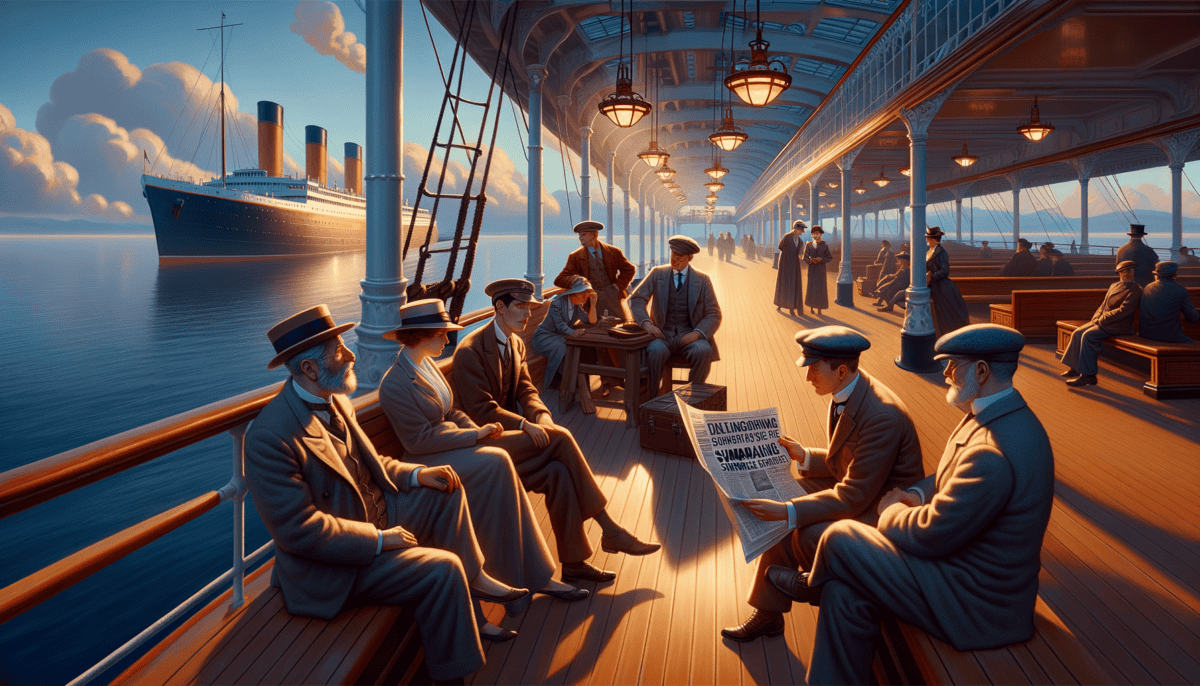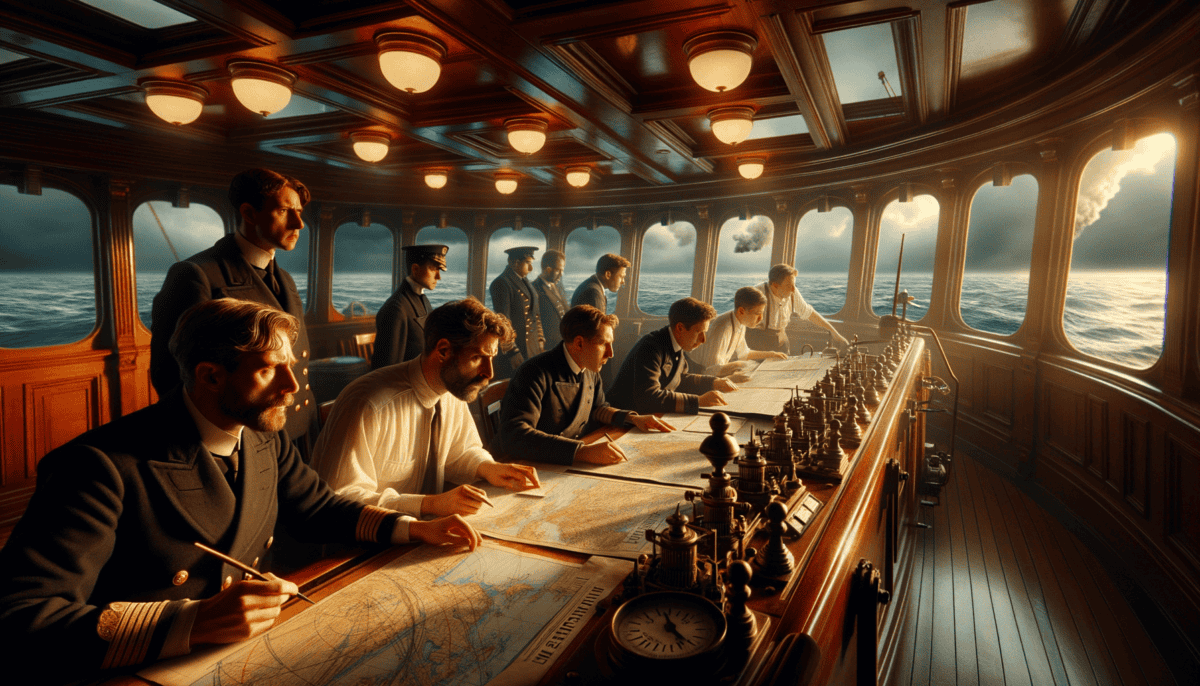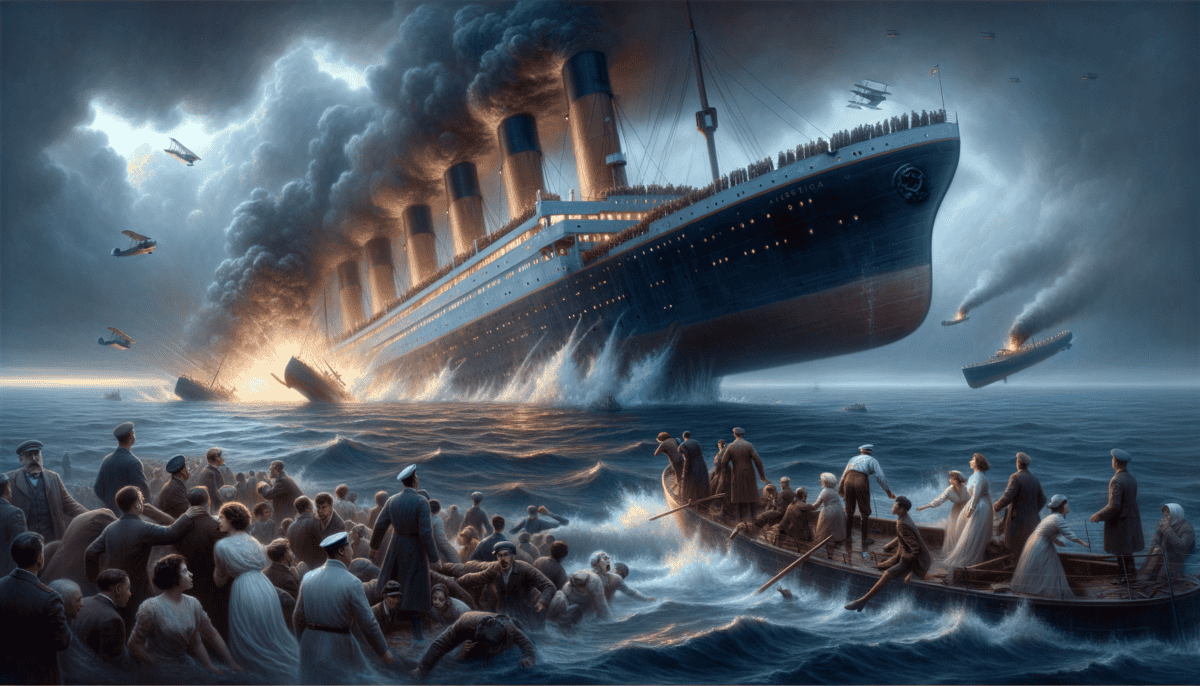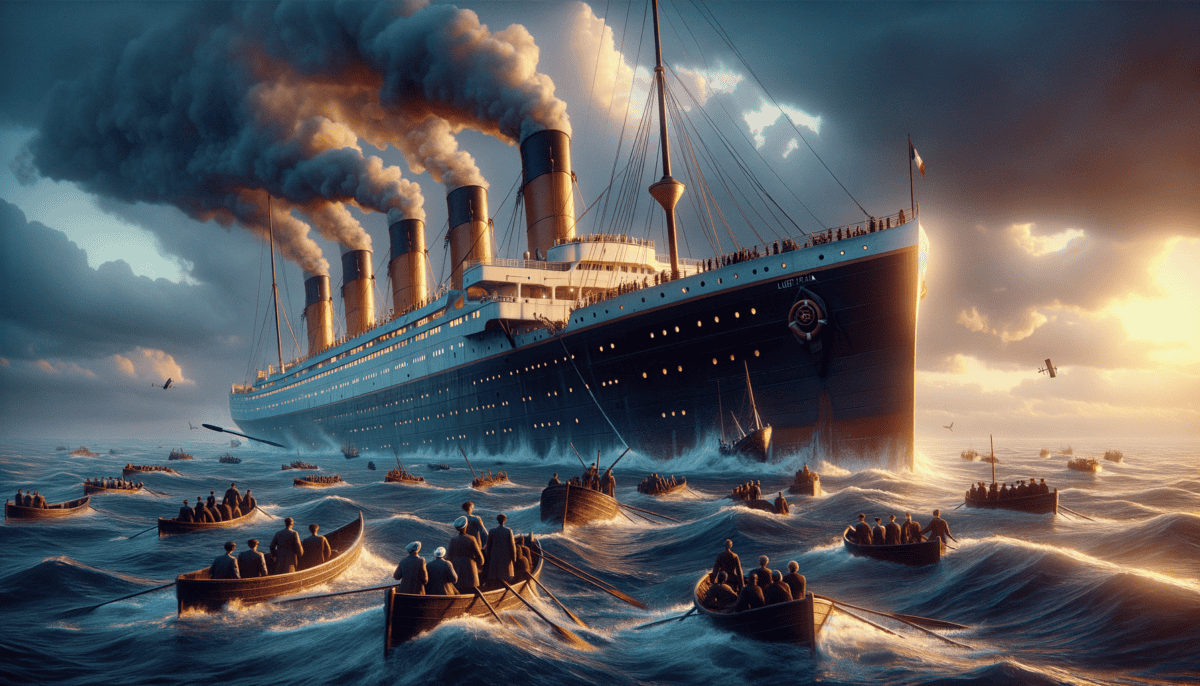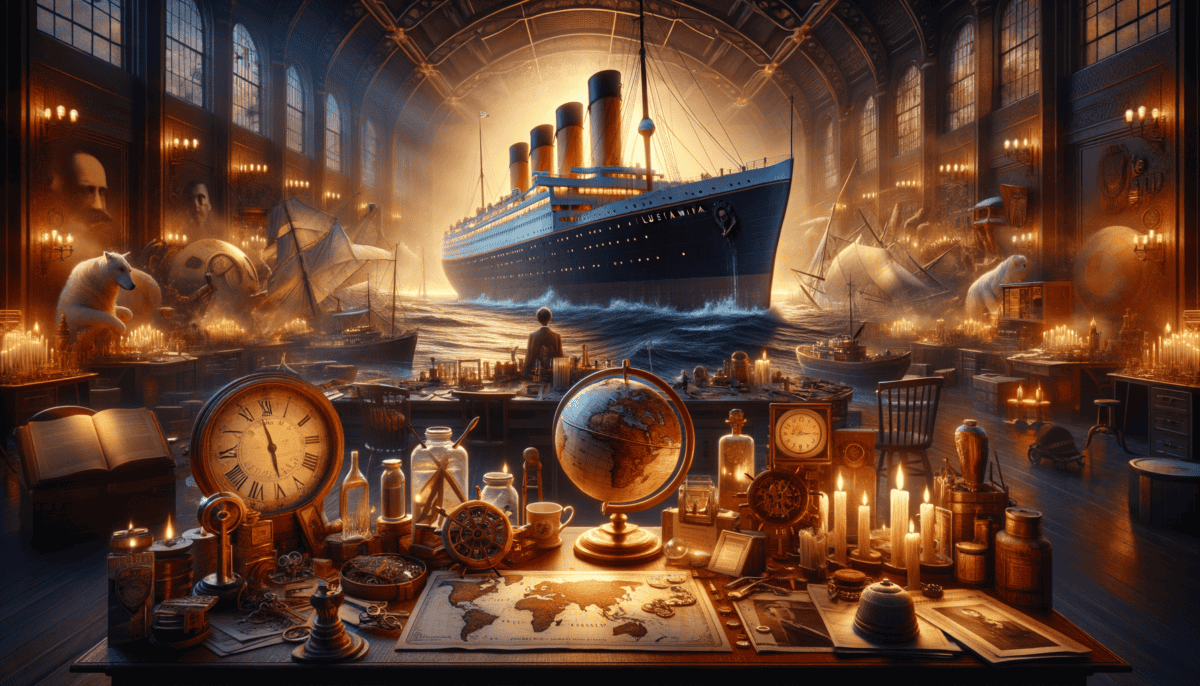A Grand Ship Sets Sail
On a bright spring morning in 1915, the mighty RMS Lusitania stood tall at the Liverpool dock. She was one of the biggest and fastest ships ever built! People called her the “Greyhound of the Seas” because she could zoom across the ocean so quickly.
Little Tommy Anderson jumped up and down with excitement as he held his mother’s hand. “Look how big it is, Mama!” he shouted, pointing at the ship’s huge black and red sides. His mother smiled, but Tommy could see worry in her eyes.
“Why are you scared, Mama?” Tommy asked.
“There’s a war happening in Europe, dear,” she replied softly. “But Captain Turner will keep us safe on our way to New York.”
Life on the Ship
Inside, the Lusitania was like a floating palace! The halls had beautiful wooden walls and soft carpets. There were fancy rooms where people could eat delicious meals. Kids like Tommy could play games on the deck and watch the waves splash below.
Captain William Turner stood on the bridge, looking out at the sea through his binoculars. He was a brave man who had sailed ships for many years. But these were different times – German submarines were hunting in the waters ahead.
“We must be extra careful on this voyage,” Captain Turner told his crew. “Keep your eyes open for anything unusual in the water.”
The Passengers
People from all over the world were on the ship:
• Rich families in fancy clothes
• Poor families looking for a new life in America
• Famous artists and writers
• Brave sailors and crew members
• Children excited for their first big adventure
Mr. Charles Frohman, a famous theater man from New York, sat in a deck chair reading his newspaper. Next to him, Mrs. Margaret Gwyer taught her little daughter Alice how to play shuffleboard on the deck.
As the sun began to set on their first day at sea, passengers gathered to watch the beautiful orange sky. The ship’s mighty engines hummed below, pushing them forward into the vast Atlantic Ocean.
Captain Turner wrote in his log: “Day 1 – Fair weather, calm seas. 1,959 souls aboard. God willing, we shall have a peaceful crossing to New York.”
Tommy Anderson stood at the rail with his mother, watching England disappear behind them. The adventure was just beginning, but nobody knew what dangers lay ahead in the deep blue waters of the Atlantic.
Dark Waters Ahead
The morning fog rolled across the deck of the Lusitania as she cut through the waves. Tommy Anderson pressed his nose against the cold glass window of the dining room. The ocean looked different today – darker and more mysterious.
“Did you hear about the warning?” whispered Mrs. Peterson to Tommy’s mother at breakfast. She held up a newspaper with big black letters. Some passengers started talking in worried voices.
“NOTICE! Travelers planning to cross the Atlantic are reminded that a state of war exists between Germany and Great Britain…”
Worry Spreads
Captain Turner paced the bridge, his face serious. The wireless radio crackled with messages about German U-boats in nearby waters. These underwater boats were like sea monsters, hiding beneath the waves.
“More steam to the engines!” he ordered. “The faster we go, the safer we’ll be.”
Tommy watched the sailors run around the deck. They were checking the lifeboats and teaching passengers what to do if something bad happened.
Life Goes On
Even with the worry, people tried to have fun. In the fancy first-class dining room, a band played happy music. Ladies wore their prettiest dresses to dinner. Children like Tommy played games in the ship’s playroom.
“Look what I found!” Tommy showed his mother a toy soldier he got from his new friend Billy. They had been playing war games, but Tommy’s mother didn’t like that.
“Let’s play something else,” she said softly. “How about a game of cards?”
The Shadows Below
Deep under the waves, German U-boat captains were hunting. They had orders to sink any British ships they found. The Lusitania was sailing right into dangerous waters.
At night, the ship’s lights were dimmed. The darkness made some passengers nervous. Tommy could hear them talking:
“Will we be safe?”
“The ship is too fast for submarines!”
“God protect us all.”
• Unusual waves in the water
• Strange objects floating nearby
• Other ships acting suspicious
That night, Tommy couldn’t sleep. The ship’s deep horn sounded in the fog, like a giant whale calling out. His mother held him close and sang soft lullabies, but both of them knew something wasn’t right.
From his cabin window, Tommy watched the dark waves splash against the ship. Somewhere out there, danger was waiting. The Lusitania sailed on through the night, her passengers hoping for the best but preparing for the worst.
Approaching Destiny
The cold morning mist wrapped around the Lusitania like a thick blanket. Tommy watched from the deck as Ireland’s green coast appeared far away. They were almost home, but something felt wrong.
“Look at those seagulls!” Tommy pointed at the white birds following the ship. His mother squeezed his hand tighter than usual. She kept looking at the water, searching for something.
Warning Signs
The wireless room buzzed with urgent messages. Officer David Thompson’s face turned pale as he read them:
“U-boats active near Irish coast. Three ships sunk yesterday. Exercise extreme caution.”
“Mommy, why are we going slower?” Tommy asked. The big ship’s engines had changed their sound. The mighty Lusitania wasn’t racing through the waves like before.
“We’re being careful, dear,” his mother said. But her voice shook a little.
Last Peaceful Moments
In the grand dining room, breakfast was served as usual. The band played cheerful music, but fewer people were dancing. Most passengers stood by the windows, watching the sea.
Tommy’s friend Billy ran up with exciting news. “The sailors are doing lifeboat practice again! Want to watch?”
The two boys counted the lifeboats: “One, two, three…” There were many boats, but some passengers whispered there weren’t enough for everyone.
The Fog Lifts
Around noon, the sun finally broke through. The sea turned a beautiful blue-green, but this made the crew more nervous. Clear weather meant submarines could see them better.
Captain Turner ordered special lookouts:
• Four men watching from the bow
• Extra watches on both sides of the ship
“I see strange bubbles!” a young sailor suddenly shouted. Everyone ran to look, but it was just a school of dolphins playing in the waves.
Final Hours
The afternoon grew quiet. Too quiet. Even the seagulls had disappeared. Tommy noticed the crew running around more, checking everything twice.
“Why don’t we go inside?” his mother suggested. “It’s almost time for lunch.”
As they walked to the dining room, Tommy heard the ship’s horn blast three times. It sounded different now – like a warning cry. The mighty Lusitania sailed on through the dangerous waters, her passengers hoping they would reach safety soon.
In the wireless room, another message arrived. The operator’s hands shook as he read it: “German submarines spotted near Old Head of Kinsale. All ships take extreme caution.” The coast of Ireland was just ahead, but would they make it there safely?
The Fatal Strike
At 2:10 PM on May 7, 1915, the sea was calm and the sun bright. Tommy was finishing his lunch when everything changed.
“Look out! Torpedo!” came a desperate cry from above.
Before anyone could move, a loud BOOM shook the whole ship! The Lusitania jerked sideways like a wounded animal. Plates crashed to the floor. People screamed.
Moments of Chaos
“Mommy!” Tommy cried as the lights went out. His mother grabbed him close. All around them, people rushed to stand up.
On the bridge, Captain Turner’s face went white. He could see the torpedo’s trail in the water – a straight line of bubbles leading back to where the U-boat lurked. The mighty ship was already starting to lean to one side.
Race Against Time
The crew worked fast to lower the lifeboats. But things went wrong:
• Some boats got stuck
• People were scared and pushing
“Stay calm!” shouted the sailors. “Women and children first!”
Tommy and his mother made it to the deck. The scene was scary. The ocean looked much closer than before because the ship was tipping.
Heroes in Action
Leslie Morton, a young lookout who first spotted the torpedo, helped little kids find their parents. An old man gave his life jacket to a young mother. Crew members stayed at their posts, sending radio calls for help.
“S.O.S! S.O.S! Lusitania torpedoed off Old Head of Kinsale. Come quick!”
Through his periscope, the German U-boat captain watched in silence. He hadn’t expected the huge ship to sink so fast. Even he seemed surprised by what his torpedo had done.
Eighteen Minutes
The mighty Lusitania was dying. Water rushed in through the giant hole in her side. The ship’s electricity failed completely, leaving people in dark corridors.
Tommy held his mother’s hand tight as they waited their turn. The band that played happy music at breakfast was gone. Now there were only scared voices and the sound of rushing water.
“Look, rescue ships!” someone shouted. But they were still far away. Small fishing boats from the Irish coast had seen the smoke signals and were coming to help.
Nobody knew it then, but the great ship had just minutes left. The ocean was about to change history forever, and nothing would be the same after this day.
Waves of Courage
The mighty Lusitania slipped beneath the waves at 2:28 PM. The cold Atlantic swallowed nearly 2,000 people. Now the real fight for survival began.
Into the Deep
Tommy felt the icy water grab him like a giant hand. His mother held him tight as they floated away from the sinking ship. All around them, people splashed and called for help.
“Hold onto anything that floats!” sailors shouted. “Don’t give up!”
The sea was full of floating things – wooden chairs, boxes, and pieces of the ship. People grabbed whatever they could find. Some lucky ones made it into lifeboats that hadn’t broken.
Heroes of the Sea
Irish fishing boats raced to save people. The brave fishermen pulled survivors from the cold water. One small boat saved 40 people!
Little Tommy couldn’t stop shaking. A kind fisherman wrapped him in a warm blanket. His mother hugged him close, crying happy tears that they were both safe.
• A baby floated safely in a big purse
• A dog saved three people by pulling them to a boat
• A group of sailors linked arms to make a human chain in the water
Race to Land
The Irish town of Queenstown opened its arms to help. People shared their homes with wet, cold survivors. Doctors and nurses worked hard to save lives.
“These brave Irish people are angels,” said one survivor. “They gave us dry clothes, hot tea, and warm beds.”
Sad News Spreads
The whole world was shocked when they heard about the Lusitania. Newspapers everywhere told the sad story. Many countries got very angry at Germany.
Some families got happy news about survivors. But many others learned they had lost someone they loved. It was one of the saddest days in ocean history.
Memories and Hope
The survivors would never forget that day. Tommy grew up to tell his grandchildren about how brave people helped each other. He remembered both the sad parts and the amazing kindness he saw.
Ships now sailed more carefully in dangerous waters. The world learned important lessons about keeping people safe at sea. But the biggest changes were still to come, as the sinking of the Lusitania would help push America toward joining World War I.
The story of those brave survivors, and the heroes who saved them, would be told for many years to come. The mighty ship was gone, but its tale would live forever.
A World Forever Changed
The sinking of the Lusitania changed everything. People all over America were very angry. How could Germany sink a ship full of regular people?
America Speaks Up
President Woodrow Wilson sent a strong message to Germany. “You cannot sink passenger ships!” he said. “This must stop!”
“This is not what civilized nations do,” the President declared. “We must protect innocent lives at sea.”
Tommy’s New Life
Little Tommy grew up to be a strong young man. He never forgot that day in the cold water. But he also remembered the brave people who helped save lives.
“We must always help others,” Tommy would tell children. “Just like those Irish fishermen helped us.”
Making Ships Safer
After the Lusitania sank, people made new rules for ships:
• Safety drills became required
• Ships got better radio systems
• Warning systems improved
Remembering the Lost
People built special places to remember those who died. In Ireland, a beautiful memorial shows the names of all 1,198 people who were lost.
Every year, families come to put flowers by the memorial. They tell stories about their brave relatives who were on the ship.
“We will never forget their courage,” said one visitor. “Their story teaches us about peace and helping others.”
Lessons for Today
The Lusitania story still teaches us important things:
• Be kind to others in need
• Stand up for what’s right
• Work together in hard times
• Keep people safe
A Story That Lives On
Today, special underwater cameras show us the Lusitania at the bottom of the ocean. Scientists study the ship to learn more about what happened.
Museums around the world tell the Lusitania’s story. They show things that were saved from the ship. People can see pictures of the brave passengers and crew.
The mighty ship may be gone, but its story lives in our hearts. It teaches us about bravery, kindness, and working together. Most importantly, it shows us how to make the world a better, safer place for everyone.
Little Tommy’s grandchildren now tell their own children about that day. The story of the Lusitania sails on through time, reminding us all to be brave and kind, just like those heroes from long ago.


